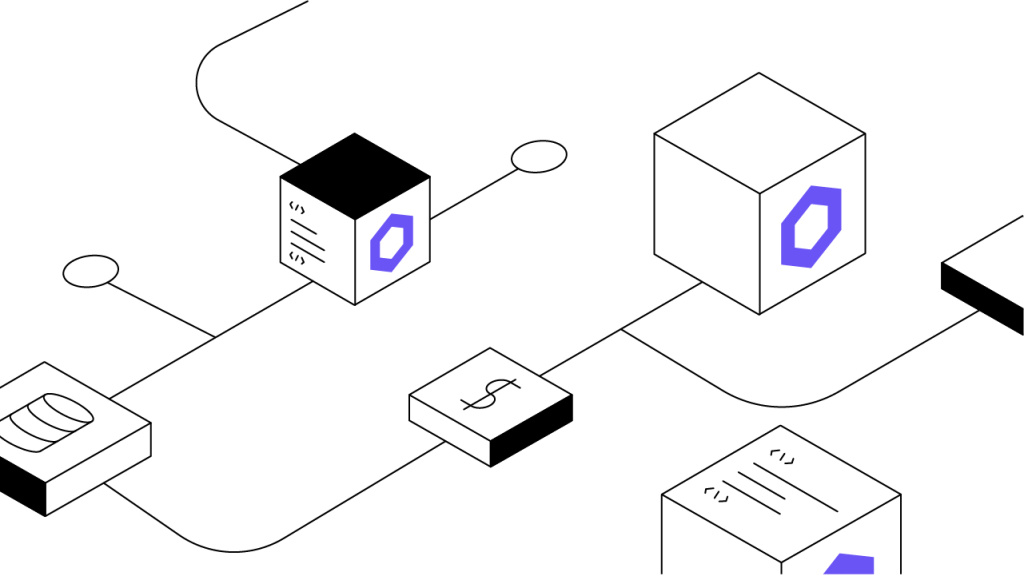Contents
Chainlink (LINK) In Practice
Some smart contracts need to bring data from off-chain to the blockchain. Find out how Chainlink’s blockchain-agnostic oracle is bridging the data bridge.

Summary
is a oracle platform bringing the capital markets onchain and powering the majority of decentralized finance (DeFi). The Chainlink stack provides the essential data, interoperability, compliance, and privacy standards needed to power advanced blockchain use cases for institutional tokenized assets, lending, payments, stablecoins, and more. Since inventing decentralized oracle networks, has enabled tens of trillions in transaction value and now secures the vast majority of DeFi.
Chainlink’s Enterprise Applicability
Chainlink focuses on providing a network for that need secure and reliable connections to real-world data from outside a blockchain network. Because smart contracts can be developed on many different blockchain platforms, Chainlink itself is inherently blockchain-agnostic. At its core, Chainlink does not prefer one blockchain to another, and does not include any features to make it easier for developers to build exclusively on a certain blockchain.
Initially, Chainlink was built to connect with the , , and blockchains because they already had a good deal of support and integration with large businesses and institutions. The Ethereum blockchain is also widely considered the current gold standard for programmability, which is vital to the development of smart contracts — one of the key areas where oracles provide value to a blockchain. Chainlink is continuing to build external adaptors to facilitate interoperability with all blockchains.
Unlock the future of money on Gemini
Start your crypto journey in minutes on the trusted crypto-native finance platform
In parallel, Chainlink is also building out functionality to integrate with a wider variety of data sources by becoming increasingly interoperable with a growing number of representing real-world data feeds. Only a minimal amount of coding is required to make an existing API Chainlink-friendly. Once optimized for Chainlink, an API can provide data to smart contract requests through Chainlink’s oracle system. The specialized adapters that Chainlink requires have been designed for easy setup in any programming language, which increases accessibility to data providers.
Chainlink also offers significant support and resources for software developers on both the client and data-provider sides. Chainlink wants to make it easy to connect smart contract developers with APIs that they are already familiar with; it also aims to provide opportunities for data providers — who can generate revenue from smart contract requests once their APIs become Chainlink-compatible. Chainlink is blockchain-agnostic; it allows data providers to sell their services to projects that operate on any blockchain network. Overall, Chainlink maintains an active role in building and maintaining productive interactions between smart contract developers and the data they need.
What Is Chainlink’s Real-World Use Case?
Chainlink is the only all-in-one platform that fulfills the requirements of any institutional blockchain use case. The Chainlink platform enables developers and institutions to access all the critical data, interoperability, compute, compliance, privacy, and legacy-system connectivity required for advanced blockchain applications that link the onchain and offchain worlds. Chainlink solves four fundamental problems for institutions interacting with tokenized assets:
The data problem. Tokenized assets need real-world information to be usable in transactions, such as , reference data, and data. Chainlink is the market leader in bringing real-world data onchain securely and accurately.
The liquidity problem. Financial institutions need tokenized assets that can be securely accessed and moved across blockchain networks in order to maximize liquidity. is the only cross-chain interoperability standard that securely connects any public or private blockchain, opening up global markets for tokenized assets.
The synchronization problem. Tokenized assets must remain synchronized with legacy systems once issued across multiple chains. Chainlink is the only platform that offers reliable offchain data, system connectivity, and secure cross-chain interoperability, enabling a Unified Golden Record that stays with assets anywhere.
The compliance problem. Regulated institutions require compliance enforcement capabilities such as identity verification (KYC), risk screening (AML), exploit protection, and asset-specific restrictions. The Chainlink Automated Compliance Engine extends existing financial infrastructure for identity and compliance data to blockchains and tokenized assets.
Chainlink Partnerships and Community Growth
Chainlink is at the forefront of financial innovation and the global tokenization trend. Traditional financial institutions and infrastructures, such as Swift, DTCC, Euroclear, J.P. Morgan, Mastercard, Central Bank of Brazil, UBS, SBI, Fidelity International, ANZ, and are adopting Chainlink as fundamental infrastructure as they move toward tokenizing trillions onchain.
Chainlink also hosts community events such as that put developers’ skills to the test in a competition setting, which provides developers with the opportunity to earn grants for further development. The winners of the 2020 virtual hackathon connected a Tesla Vehicle API to a Chainlink oracle via an external adaptor to create a peer-to-peer rental application that uses smart contracts to arrange agreements between owners and renters. This is just one instance of smart contracts enabling a new business model by using Chainlink oracles to connect a blockchain-based application to external, real-world data.

Author
Is this article helpful?
